新概念第二册语法解析及练习:现在完成时
(新概念英语)高中英语第二册语法总结现在完成进行时5篇
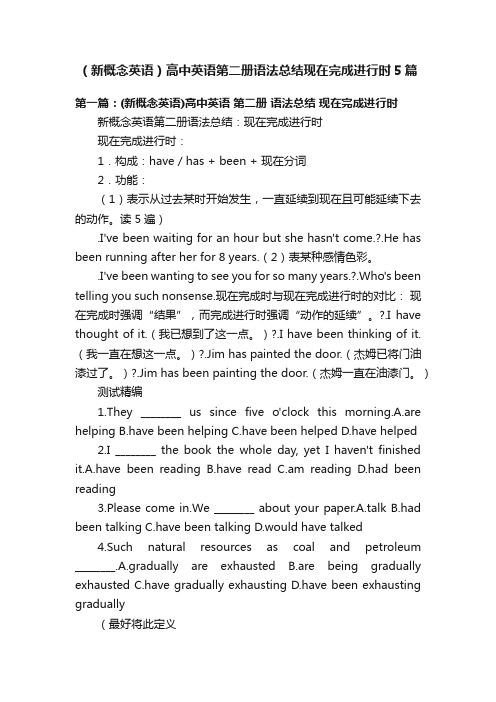
(新概念英语)高中英语第二册语法总结现在完成进行时5篇第一篇:(新概念英语)高中英语第二册语法总结现在完成进行时新概念英语第二册语法总结:现在完成进行时现在完成进行时:1.构成:have / has + been + 现在分词2.功能:(1)表示从过去某时开始发生,一直延续到现在且可能延续下去的动作。
读 5遍).I've been waiting for an hour but she hasn't come.?.He has been running after her for 8 years.(2)表某种感情色彩。
.I've been wanting to see you for so many years.?.Who's been telling you such nonsense.现在完成时与现在完成进行时的对比:现在完成时强调“结果”,而完成进行时强调“动作的延续”。
?.I have thought of it.(我已想到了这一点。
)?.I have been thinking of it.(我一直在想这一点。
)?.Jim has painted the door.(杰姆已将门油漆过了。
)?.Jim has been painting the door.(杰姆一直在油漆门。
)测试精编1.They ________ us since five o'clock this morning.A.are helping B.have been helping C.have been helped D.have helped2.I ________ the book the whole day, yet I haven't finished it.A.have been reading B.have read C.am reading D.had been reading3.Please come in.We ________ about your paper.A.talk B.had been talking C.have been talking D.would have talked4.Such natural resources as coal and petroleum ________.A.gradually are exhausted B.are being gradually exhausted C.have gradually exhausting D.have been exhausting gradually(最好将此定义5.It ________ almost every day so far this month.A.is rainingB.rainedC.rainsD.has been raining用所给动词正确时态填空:1.You should go to bed.You ________(watch)TV for 5 hours.2.I ________(write)letters since breakfast.3.I ________(write)3 letters since breakfast.4.Sorry, but Mr.Smith ________(leave)for Beijing.5.I ________(look)for him everywhere, where can he be?(后设答案,大家不要偷看哦~(*^__^*)嘻嘻……)KEYS1.B2.A3.C4.B5.D用所给动词正确时态填空:1.have been watching2.have been writing3.have written4.has left5.have been looking第二篇:新概念英语第二册语法总结新概念英语二册语法详解和总结《一、学习前的准备《新概念英语第二册》旨在全面训练学生的4项技能、理解、口语、阅读、写作。
新概念第二册语法解析及练习而今完成时
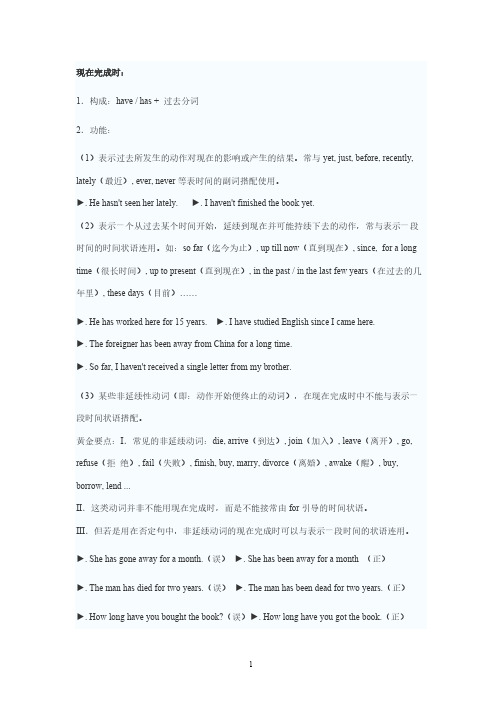
现在完成时:1.构成:have / has + 过去分词2.功能:(1)表示过去所发生的动作对现在的影响或产生的结果。
常与yet, just, before, recently, lately(最近), ever, never等表时间的副词搭配使用。
►. He hasn't seen her lately. ►. I haven't finished the book yet.(2)表示一个从过去某个时间开始,延续到现在并可能持续下去的动作,常与表示一段时间的时间状语连用。
如:so far(迄今为止), up till now(直到现在), since, for a long time(很长时间), up to present(直到现在), in the past / in the last few years(在过去的几年里), these days(目前)……►. He has worked here for 15 years. ►. I have studied English since I came here.►. The foreigner has been away from China for a long time.►. So far, I haven't received a single letter from my brother.(3)某些非延续性动词(即:动作开始便终止的动词),在现在完成时中不能与表示一段时间状语搭配。
黄金要点:I.常见的非延续动词:die, arrive(到达), join(加入), leave(离开), go, refuse(拒绝), fail(失败), finish, buy, marry, divorce(离婚), awake(醒), buy, borrow, lend ...II.这类动词并非不能用现在完成时,而是不能接常由for引导的时间状语。
新概念英语第二册语法解析及练习题分享
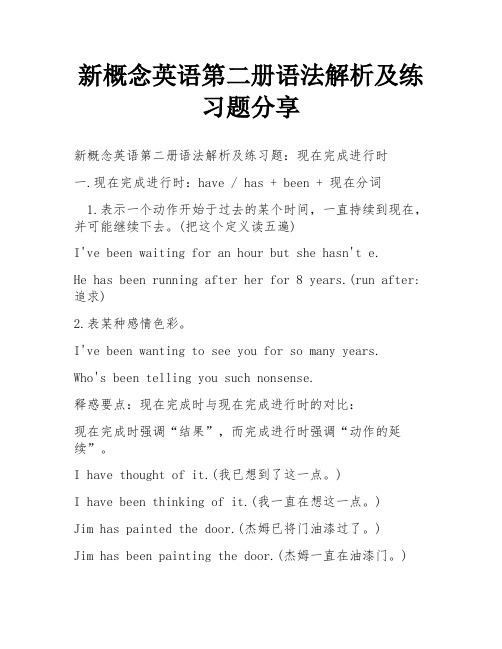
新概念英语第二册语法解析及练习题分享新概念英语第二册语法解析及练习题:现在完成进行时一.现在完成进行时:have / has + been + 现在分词1.表示一个动作开始于过去的某个时间,一直持续到现在,并可能继续下去。
(把这个定义读五遍)I've been waiting for an hour but she hasn't e.He has been running after her for 8 years.(run after: 追求)2.表某种感情色彩。
I've been wanting to see you for so many years.Who's been telling you such nonsense.释惑要点:现在完成时与现在完成进行时的对比:现在完成时强调“结果”,而完成进行时强调“动作的延续”。
I have thought of it.(我已想到了这一点。
)I have been thinking of it.(我一直在想这一点。
)Jim has painted the door.(杰姆已将门油漆过了。
)Jim has been painting the door.(杰姆一直在油漆门。
)练习:1. They ________ us since five o'clock this morning.A. are helpingB. have been helpingC. have been helpedD. have helped2. I ________ the book the whole day, yet I haven't finished it.A. have been readingB. have readC. am readingD. had been reading3. Please e in. We ________ about your paper.A. talkB. had been talkingC. have been talkingD. would have talked4. Such natural resources as coal and petroleum________.A. gradually are exhaustedB. are being gradually exhaustedC. have gradually exhaustingD. have been exhausting gradually5. It ________ almost every day so far this month.A. is rainingB. rainedC. rainsD. has been raining用所给动词正确时态填空。
新概念第二册语法知识点汇总
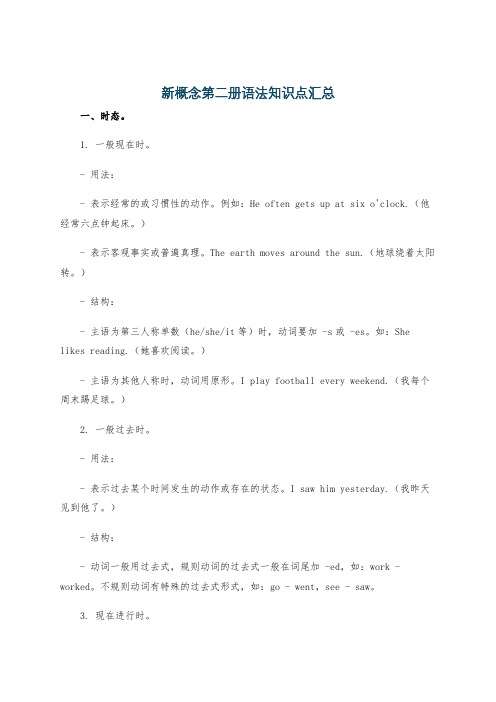
新概念第二册语法知识点汇总一、时态。
1. 一般现在时。
- 用法:- 表示经常的或习惯性的动作。
例如:He often gets up at six o'clock.(他经常六点钟起床。
)- 表示客观事实或普遍真理。
The earth moves around the sun.(地球绕着太阳转。
)- 结构:- 主语为第三人称单数(he/she/it等)时,动词要加 -s或 -es。
如:She likes reading.(她喜欢阅读。
)- 主语为其他人称时,动词用原形。
I play football every weekend.(我每个周末踢足球。
)2. 一般过去时。
- 用法:- 表示过去某个时间发生的动作或存在的状态。
I saw him yesterday.(我昨天见到他了。
)- 结构:- 动词一般用过去式,规则动词的过去式一般在词尾加 -ed,如:work - worked。
不规则动词有特殊的过去式形式,如:go - went,see - saw。
3. 现在进行时。
- 表示现在正在进行的动作。
Look! She is dancing.(看!她正在跳舞。
)- 结构:- be动词(am/is/are)+动词的 -ing形式。
He is reading a book.(他正在读一本书。
)4. 过去进行时。
- 用法:- 表示过去某个时刻或某段时间正在进行的动作。
At that time yesterday, I was doing my homework.(昨天那个时候,我正在做家庭作业。
)- 结构:- was/were+动词的 -ing形式。
They were playing football at threeo'clock yesterday afternoon.(他们昨天下午三点正在踢足球。
)5. 现在完成时。
- 用法:- 表示过去发生的动作对现在造成的影响或结果。
I have lost my key.(我把钥匙丢了。
新概念英语第二册 Lesson 5 语法
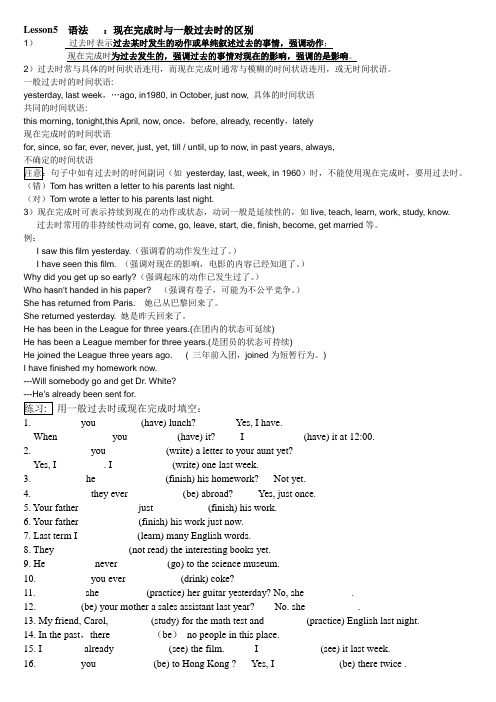
Lesson5 语法:现在完成时与一般过去时的区别1)过去时表示过去某时发生的动作或单纯叙述过去的事情,强调动作;现在完成时为过去发生的,强调过去的事情对现在的影响,强调的是影响。
2)过去时常与具体的时间状语连用,而现在完成时通常与模糊的时间状语连用,或无时间状语。
一般过去时的时间状语:yesterday, last week,…ago, in1980, in October, just now, 具体的时间状语共同的时间状语:this morning, tonight,this April, now, once,before, already, recently,lately现在完成时的时间状语for, since, so far, ever, never, just, yet, till / until, up to now, in past years, always,不确定的时间状语yesterday, last, week, in 1960)时,不能使用现在完成时,要用过去时。
(错)Tom has written a letter to his parents last night.(对)Tom wrote a letter to his parents last night.3)现在完成时可表示持续到现在的动作或状态,动词一般是延续性的,如live, teach, learn, work, study, know.过去时常用的非持续性动词有come, go, leave, start, die, finish, become, get married等。
例:I saw this film yesterday.(强调看的动作发生过了。
)I have seen this film. (强调对现在的影响,电影的内容已经知道了。
)Why did you get up so early?(强调起床的动作已发生过了。
新概念英语第二册语法知识点汇总

新概念英语第二册语法知识点汇总本文档将对《新概念英语第二册》中的语法知识点进行汇总。
以下是该册教材中的重要语法知识点:1. 时态- 现在完成时:表示过去发生的事情对现在产生的影响,构成为"have/has + 过去分词"。
- 过去完成时:表示过去某个时间或事件之前发生的动作或状态,构成为"had + 过去分词"。
- 将来进行时:表示将来某个时间正在进行的动作,构成为"will be + 动词-ing"。
2. 句型- There be句型:表示某处存在某物或某人,构成为"There + be 动词 + 宾语"。
- 虚拟语气:表示与事实相反的假设、愿望或建议的语气,构成为"if + 主语 + 过去式,主语 + would/could/might + 动词原形"。
3. 名词- 可数名词与不可数名词:可数名词可以同时使用单复数形式,而不可数名词只能使用单数形式。
- 复合名词:由两个或更多个词构成的名词,如"homework"、"football"等。
4. 冠词- 定冠词:表示特指的冠词,如"the"。
- 不定冠词:表示泛指的冠词,如"a/an"。
5. 代词- 主格代词:在句子中作主语,如"I"、"you"等。
- 宾格代词:在句子中作宾语,如"me"、"you"等。
- 物主代词:表示所属关系的代词,如"my"、"your"等。
6. 动词- 不定式:表示动作的动词原形,可以作主语、宾语等,如"to eat"。
- 动词的时态变化:根据不同的时态,在动词前加不同的助动词,如"is/am/are"表示现在进行时。
新概念第二册时态篇

congratulatons for
your progress
单击转到目录页
指示一般现在时的时间短语
1.频度副词: sometimes(有时), often, always(总是), usually(通常), seldom(很少) 2. in the morning/afternoon/evening 3. every day/morning… 4. on Sundays(星期日)…
He often goes to the English corner. 3.表主语具备的性格和能力等:
e.g. She likes noodles. They speak French.
4.普遍真理和自然规律:
e.g. Two plus four is six.
The moon goes around the earth.
❖ A had eaten B ate
❖ C are eating D have eating
❖ 4.Maybe it was because he __A_ to the radio, but he didn’t notice the dark object in the road until it was too late.
❖ A I called
B I’m calling
❖ C I’ve called D I’ll call
❖ 3.—Tony, where are the cookies ? Don’t tell me you_B_ them all! Again!
❖ ---Yes, I did. I couldn’t help it. They were so good.
新概念英语第二册语法-现在完成进行时

新概念英语第二册语法-现在完成进行时1.构成:have / has + been + 现在分词2.功能:(1)表示从过去某时开始发生,一直延续到现在且可能延续下去的动作。
(将此定义读 5遍). I've been waiting for an hour but she hasn't come.. He has been running after her for 8 years.(2)表某种感情色彩。
. I've been wanting to see you for so many years.. Who's been telling you such nonsense.现在完成时与现在完成实行时的对比:现在完成时强调“结果”,而完成实行时强调“动作的延续”。
. I have thought of it.(我已想到了这个点。
). I have been thinking of it.(我一直在想这个点。
). Jim has painted the door.(杰姆已将门油漆过了。
). Jim has been painting the door.(杰姆一直在油漆门。
)测试精编1. They ________ us since five o'clock this morning.A. are helpingB. have been helpingC. have been helpedD. have helped2. I ________ the book the whole day, yet I haven't finished it.A. have been readingB. have readC. am readingD. had been reading3. Please come in. We ________ about your paper.A. talkB. had been talkingC. have been talkingD. would have talked4. Such natural resources as coal and petroleum ________.A. gradually are exhaustedB. are being gradually exhaustedC. have gradually exhaustingD. have been exhausting gradually5. It ________ almost every day so far this month.A. is rainingB. rainedC. rainsD. has been raining用所给动词准确时态填空:1. You should go to bed. You ________ (watch) TV for 5 hours.2. I ________ (write) letters since breakfast.3. I ________ (write) 3 letters since breakfast.4. Sorry, but Mr. Smith ________ (leave) for Beijing.5. I ________ (look) for him everywhere, where can he be?KEYS1. B2. A3. C4. B5. D用所给动词准确时态填空:1. have been watching2. have been writing3. have written4. has left5. have been looking。
- 1、下载文档前请自行甄别文档内容的完整性,平台不提供额外的编辑、内容补充、找答案等附加服务。
- 2、"仅部分预览"的文档,不可在线预览部分如存在完整性等问题,可反馈申请退款(可完整预览的文档不适用该条件!)。
- 3、如文档侵犯您的权益,请联系客服反馈,我们会尽快为您处理(人工客服工作时间:9:00-18:30)。
现在完成时:1.构成:have / has + 过去分词2.功能:(1)表示过去所发生的动作对现在的影响或产生的结果。
常与yet, just, before, recently, lately(最近), ever, never等表时间的副词搭配使用。
►. He hasn't seen her lately. ►. I haven't finished the book yet.(2)表示一个从过去某个时间开始,延续到现在并可能持续下去的动作,常与表示一段时间的时间状语连用。
如:so far(迄今为止), up till now(直到现在), since, for a long time (很长时间), up to present(直到现在), in the past / in the last few years(在过去的几年里), these days(目前)……►. He has worked here for 15 years. ►. I have studied English since I came here.►. The foreigner has been away from China for a long time.►. So far, I haven't received a single letter from my brother.(3)某些非延续性动词(即:动作开始便终止的动词),在现在完成时中不能与表示一段时间状语搭配。
黄金要点:I.常见的非延续动词:die, arrive(到达), join(加入), leave(离开), go, refuse (拒绝), fail(失败), finish, buy, marry, divorce(离婚), awake(醒), buy, borrow, lend ... II.这类动词并非不能用现在完成时,而是不能接常由for引导的时间状语。
III.但若是用在否定句中,非延续动词的现在完成时可以与表示一段时间的状语连用。
►. She has gone away for a month.(误)►. She has been away for a month (正)►. The man has died for two years.(误)►. The man has been dead for two years.(正)►. How long have you bought the book?(误)►. How long have you got the book.(正)(4)注意since的用法:They haven't had any trouble since they came here. It has been ten years since we met last time. ►. He has been here since 1980. ►. He has been here since ten years ago.几组对比:►. He has gone to Shanghai. 他到上海去了。
►. He has been to Shanghai. 他去过上海。
►. She has gone. 她已走了。
►. She is gone. 她缺席了。
(或者她死了。
)►. The door has been closed. 门关上了。
(动作)►. The door is closed. 门是关着的。
(状态)测试精编1. The prices ________ going up all the time in the past few years.A. keepB. keptC. have keptD. are keeping2. For the whole period of two months, there ________ no rain in this area.A. isB. will beC. has beenD. have been3. Today is Jane's wedding day. She ________ John.A. have just married withB. was just married toC. has just been married toD. just has been married to4. No wonder the flower have withered, they ________ any water for ages.A. hadn'tB. haven'tC. haven't hadD. hadn't had5. Nowadays computer ________ a wide application with the development of production and science.A. foundB. has foundC.findsD. had found过去进行时:1.构成:were / was + 现在分词2.功能:(1)表示过去某一时刻或阶段正在发生的动作。
►. I was playing chess at 8 yesterday evening.►. When I arrived, they were watching TV.►. They were doing housework this time last week.(2)用于条件状语从句中表示过去将来进行的动作。
►. She told me to wake him up if she was sleeping.►. I asked my friend to warn me about it as long as I was driving too fast.测试精编1. My brother ________ while he ________ his bicycle and hurt himself.A. fell / was ridingB. feel / were ridingC. had fallen / rodeD. had fallen / was riding2. He ________ his leg as he ________ in a football match.A. broke / playedB. was breaking / was playingC. broke / was playingD. was breaking / played3. -My father will be here tomorrow. -I thought that he ________ today.A. was corningB. is comingC. will comeD. comes4. Jack was going out of the shop when he collided with an old woman who ________ in.A. comeB. was comingC. had been comingD. had come5. Michike couldn't come to the telephone when Mr. Smith called her because she _____ in the lab.A. had been workingB. has been workingC. was workingD. worked一般过去时:功能:(1)表示过去某个特定时间或某一段时间发生的动作或情况。
►. We visited the school last spring.►. I went to school by bike when I was in middle school.►. China was founded in 1949.(2)在表示时间或条件等的状语从句中代替过去将来时。
►. She told me that she would not go with us if it rained the next day.►. They would not leave until she came back.►. My friend promised to marry me once she made her final decision.一般过去时,现在时和过去时的几组差异:(别以为这很简单,下面的差异你不一定明白。
)►. Her brother was a chemist.(已去世)►. Her brother is a chemist.(尚健在)►. That's all I had to say.(话已说完)►. That's all I have to say.(言之未尽)►. It was so nice to see you.(离别时用)►. It is so nice to see you.(见面时用)►. Jane did a lot of work this morning.(已是当天下午或晚上)►. Jane has done a lot of work this morning.(仍是上午)[本句现在完成时,此乃后话!]测试精编I:(用所给动词的正确进态填空)。
1. Yesterday I ________ (think) that you were not in Beijing.2. Alice usually ________ (sit) in the front of the classroom, but she ________ (sit) at the back this morning.3. He ________ (tell) the news to us three days ago.4. He________ (begin) to teach Chinese in 1990.5. she would not telephone me if she ________ (have) no time.测试精编II1. They ________ the trip until the rain stopped.A. continuedB. didn't continueC. hadn't continuedD. would continue2. The local peasants gave the soldiers clothes and food without which they ________ of hunger and cold.(without 在这里表条件,你知道吗?)A. would dieB. will dieC. would be deadD. would have died3. It was not until then that I came to know that the earth ________ around the sun.A. movedB. has movedC. will moveD. moves4. When all those present ________ he began his lecture.(重点题)A. sitB. setC. seatedD. were seated5. If I had had time, I would have written to you. But in fact I ________ not.A. haveB. would haveC. hadD. had had现在进行时:1.构成:is / am / are + 现在分词2.功能:(1)表示现在正在进行的动作。
